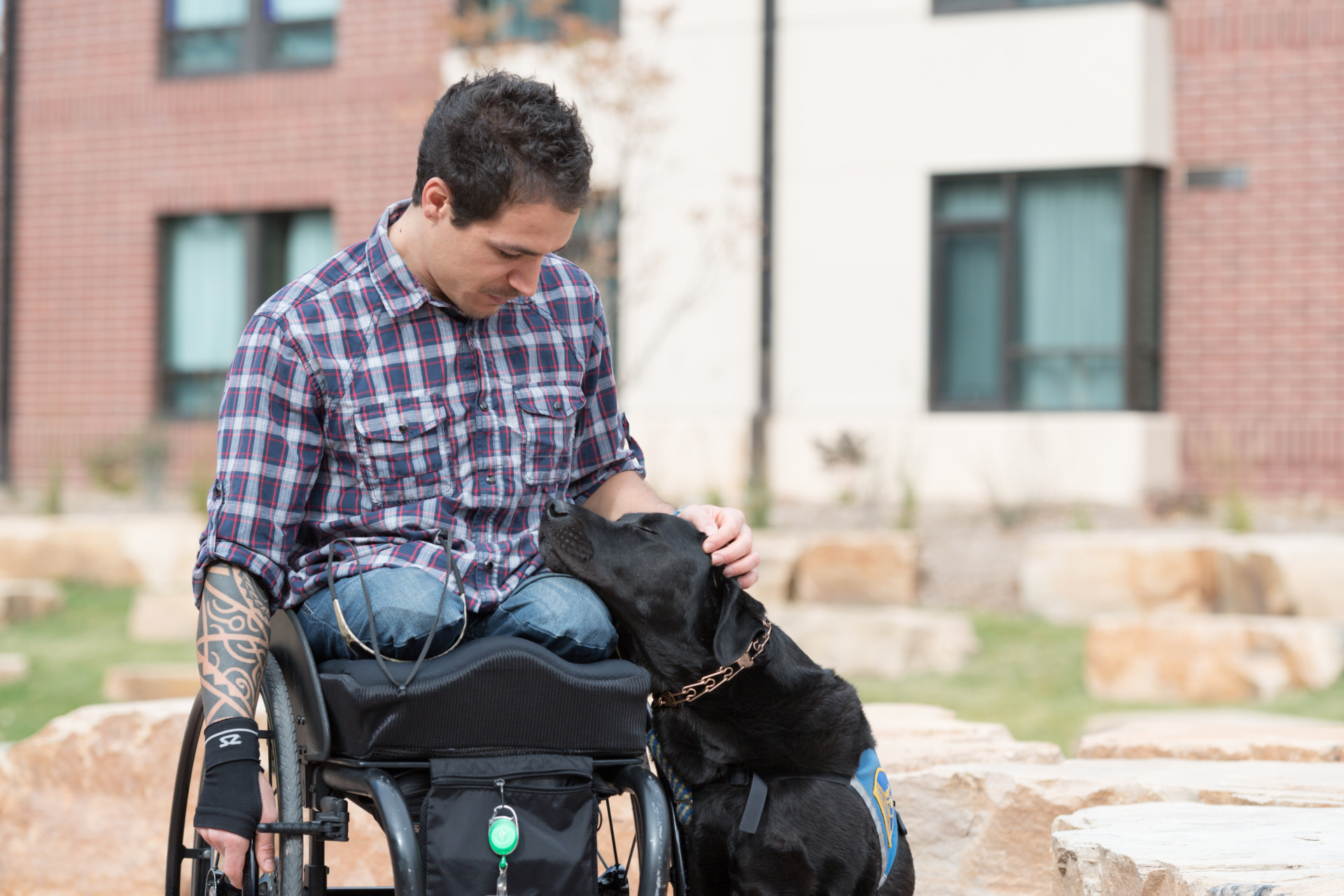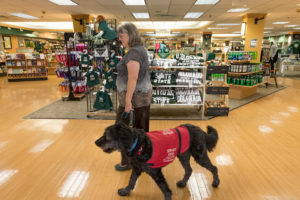
For some of CSU students, the bond they share with their service dog is a defining relationship that can mean the difference between success or hardship, and even life or death.
Who doesn’t love an adorable pet? And who would deny the importance of service dogs to the well-being of people with disabilities?
For some of Colorado State University’s student veterans, as well as guests, other students and employees with disabilities, the bond they share with their service dog exceeds companionship; it’s a defining relationship that can mean the difference between success or hardship, and even life or death.
Yet, there are growing concerns across the campus related to the impact to service dogs and those who need them when the line between them and pets and emotional support animals becomes blurred.
“The definitions of emotional support animals and service dogs are often confused with each other,” said Rose Kreston, director of Student Disability Center at CSU. “Students and employees often do not fully understand the laws and university policies that govern both designations, and this leads to potential physical conflict for service dogs on campus. It also creates opportunities for individuals to abuse rights of those in our community with disabilities who are assisted by service dogs, as protected by the Americans with Disabilities Act.”
Confusion often occurs when people misrepresent their pet or emotional support animal as a service dog – either intentionally, or because they don’t understand the differences.
By law, only dogs or miniature horses can be classified as service animals, and they must be trained to perform specific tasks for their individuals. In addition, people who have disabilities that require a service dog have different rights associated with their service dog than do individuals with emotional support animals, sometimes called assistance animals.
Dogs that are not trained as service dogs behave differently in public places than service dogs do. Behavior can include barking, biting, defecating inside of buildings, and fighting with service dogs. There have been incidents on campus of untrained dogs attacking service dogs; the service dog can be so traumatized by the experience that it can no longer perform its duties and must be given up by the person with a disability or be retrained – at great expense.
“The consequences for a service dog that has a negative interaction with a pet or emotional support animal are very serious.”
— Rose Kreston, director of Student Disability Center
“The consequences for a service dog that has a negative interaction with a pet or emotional support animal are very serious,” Kreston said. “Typically, the interaction damages the service dog’s training to a degree that it can no longer perform the duties it was trained to perform and often must be given up by the person who is dependent upon it. Service dogs can be an investment of $35,000, and the bond between a service dog and the person it serves is extremely meaningful to both.”
There are important differences between the rights of those with service dogs and those with emotional support animals. Some key differences between service animals and emotional support animals are:
Service dogs
-

Kathleen Ivy, Accommodation/Advocacy Specialist with the Student Disability Center, with her service dog “Duncan.” If the animal is not a dog or a miniature horse, it is not a service animal, by legal definition.
- A service dog is trained to do work or perform specific tasks for a specific individual with a disability. Individuals may have disabilities that are not apparent to others, including post-traumatic stress disorder, seizures, anxiety attacks, autism, diabetes, cancer, or depression. Service animals are trained to perform specific tasks designed to aid those with such disabilities.
- Examples of the work these dogs do: guide a visually impaired person, assist with hearing, mobility or stability, provide warnings in advance of a medical emergency such as a seizure, and interrupt psychological emergencies such as panic attacks.
- Service dogs can go anywhere their owner can go (with some exceptions), such as into academic buildings.
Emotional support animals
- Many kinds of animals may be used as emotional support animals, including dogs. Emotional support animals must not be wild or dangerous and must be legal to own.
- An emotional support animal has been verified to provide emotional support, comfort or therapy to an individual by a professional health care provider with appropriate qualifications. These animals provide feelings of security, familiarity and help soothe the owner.
- On campus, emotional support animals are limited to providing these services only inside of the owner’s university housing. These animals, like pets, are not allowed inside academic or administrative buildings or dining halls.
- It is a crime to misrepresent your animal as an assistance animal or service animal. This includes misusing a service animal vest, ID card or tag, or falsely claiming or exaggerating a disability.
Before emotional support animals can live with a student in a residence hall, the animal must be approved by the Student Disability Center for students and by the Office of Equal Opportunity for employees.
Individuals living in university housing must also have the animal approved by Residence Life staff, and its companionship must have been prescribed by a qualified health care provider. The resident must adhere to rules related to emotional support animals, including that emotional support animals are not allowed in campus buildings other than the specific approved residence. This includes dining facilities, the Lory Student Center and academic buildings.
Students should not bring their emotional support animals to campus prior to approval from the Student Disability Center.
“University Housing staff are fortunate to work in such close partnership with the Student Disability Center. Our approval process is directly informed by referrals from our partners in the center. Together, we work to support the success of students,” said John Malsam, associate director of Occupancy Management for Housing.
CSU’s general animal policy
- All animals must be on leash on CSU property (excludes service dogs if individual’s disability prevents them from using a leash)
- No pets or emotional support animals are allowed in non-residential buildings. This includes dining halls, the Lory Student Center, academic and classroom buildings, and administrative buildings.
- Animals cannot be left unattended on CSU property, such as in a car or tied to a tree or sign.
- CSUPD enforces animal and leash laws on campus. Call CSUPD if:
- Animal is a threat to the safety of other people or animals, or serious disruption
- Dog or other pet is off leash or unattended
- An animal that is not a service dog is in building where it is not allowed and the owner refuses to leave
- A dog is barking incessantly or any animal is causing property damage
- Animal appears to be malnourished or abused
- Other employees, including university housing employees, also enforce service animal and emotional support animal policies within academic buildings and housing.
- Policies, rules and laws related to service animals, emotional support animals and pets in campus buildings and on campus grounds include university policies, state disability laws, city ordinances, and federal laws such as the Americans with Disabilities Act and Fair Housing Act.
How to determine if a dog is a service dog
Not all disabilities are obvious. By law, when determining if a dog is a service dog, only two questions are legally permitted to be asked:
- Is this a service animal with an individual with a disability?
- What work or tasks is this animal trained to perform?
Only university employees with responsibilities for the area in which the animal is present should ask these questions, and the questions should not be asked at all if the need for the animal is apparent, such as a dog helping to pull a wheelchair or leading a visually impaired person.
Guidance from the American Counseling Association, as well as research regarding emotional support animals, says that mental health professionals should not write letters of referral for clients to use an emotional support animal unless they have specialized training, due to potential risks for clients, the public, the counselor and the animal. In keeping with those recommendations, the CSU Health Network does not provide letters of support or referral for students seeking emotional support animals or psychiatric service dogs.
Students should not to bring emotional support animals to campus without first having obtained appropriate medical or psychological evidence that the animal is necessary to aid with a disability, and must review that documentation with the Student Disability Center before bringing the emotional support animal to a residence hall.
Colorado law requires that a licensed health care provider must personally see the individual as a patient before providing a letter in support for having an emotional support animal. Online certificates are not acceptable.